
| Part of a series on Horror films |
|---|
 |
| By decade |
| By continent |
| Key topics |
A horror film score is music used and often specially written for films in the horror genre.

| Part of a series on Horror films |
|---|
 |
| By decade |
| By continent |
| Key topics |
A horror film score is music used and often specially written for films in the horror genre.
Early sound film scores included little music. Universal Studios was among several studios that had a policy of no music under their dialogue, which they felt interfered with it. [1] What little music existed in early sounds films from the studio consisted of a combination of original compositions, classical music, and published music which had been composed for use accompanying silent films. [2] In early 1931, Paramount Pictures initiated the idea of scoring films from beginning to end with music, other studios followed, including Universal creating a fully fledged score for Frankenstein (1931). [3] Just as Universal tended to reuse similar characters, actors and writers for their horror films, they also did so with their music, often using the same music again and again in film in their series. [4]
Film journalist and musician Stephen Thrower stated that following Bernard Herrmann's score to Psycho (1960), horror film soundtracks have rarely been mere background music, noting that James Bernard's music for horror film productions by Hammer have been "gallopingly melodramatic, although one has to say it often raises more giggles than goosebumps". [5]
Neil Lerner, in his book Music in the Horror Film, found that stylistically, the genre allowed for greater freedom for composers to experiment with harmony and instrumentation. [6] Approaches in the 1960s and 1970s included work from Ennio Morricone, who Thrower described as bringing "shuddering, paranoiac quality" based around jazz, electronic effects and "rampant atonal twanging" to films by Dario Argento, Aldo Lado and Lucio Fulci. [5] A short lived trend in the 1970s was for progressive rock scores in horror films following the release of The Exorcist (1973) with "Tubular Bells". Italian progressive rock band Goblin contributed to several scores for Argento, about whom Thrower stated that "like Morricone, they occasionally gave brilliant work to dumb movies" noting their scores to Spasmo and Contamination . [5] The shades of progressive rock were also found in other American productions, such as Carpenter's Halloween, with its main theme having the piano tap out five beats to the bar. [5]
Thrower found that by the 1990s, horror film soundtracks were "stuffed with pop and rock in the hope that the album might shift enough units to reach the charts.", noting the popular success of the soundtrack to Flashdance . [5]
Ennio Morricone was an Italian composer, orchestrator, conductor, trumpeter, and pianist who wrote music in a wide range of styles. With more than 400 scores for cinema and television, as well as more than 100 classical works, Morricone is widely considered one of the most prolific and greatest film composers of all time. He received numerous accolades including two Academy Awards, three Grammy Awards, three Golden Globes, six BAFTAs, ten David di Donatello, eleven Nastro d'Argento, two European Film Awards, the Golden Lion Honorary Award, and the Polar Music Prize in 2010.

Dario Argento is an Italian film director, screenwriter and producer. His influential work in the horror and giallo genres during the 1970s and 1980s has led him to being referred to as the "Master of the Thrill" and the "Master of Horror".

Suspiria is a 1977 Italian supernatural horror film directed by Dario Argento, who co-wrote the screenplay with Daria Nicolodi, partially based on Thomas De Quincey's 1845 essay Suspiria de Profundis. The film stars Jessica Harper as an American ballet student who transfers to a prestigious European dance academy but realizes, after a series of murders, that the academy is a front for a coven of witches. It also features Stefania Casini, Flavio Bucci, Miguel Bosé, Alida Valli, Udo Kier, and Joan Bennett, in her final film role.
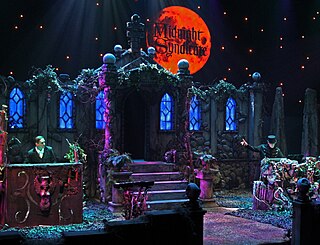
Midnight Syndicate is an American musical duo that has been working primarily in the genre of neoclassical dark ambient music since 1997 and is based in Chardon, Ohio, a suburb of Cleveland.

In Italian cinema, giallo is a genre of murder mystery fiction that often contains slasher, thriller, psychological horror, psychological thriller, sexploitation, and, less frequently, supernatural horror elements.

Goblin is an Italian progressive rock band known for their film scores. They frequently collaborate with Dario Argento, most notably creating the scores for Profondo Rosso in 1975 and Suspiria in 1977. Because their collaborator Dario Argento specializes in creating horror, suspense and slasher/giallo genre movies, scores made by Goblin in these movies often had eerie and ominous tones. CD re-releases of their scores have performed well, especially in Germany and Japan. Goblin returned with a series of live concerts in Europe in 2009 and in North America in 2013.

Claudio Simonetti is an Italian musician and film composer. The keyboardist of the progressive rock band Goblin, Simonetti has specialized in the scores for Italian and American horror films since the 1970s.

Phenomena is a 1985 Italian giallo film produced and directed by Dario Argento, who co-wrote the screenplay with Franco Ferrini. It stars Jennifer Connelly, Daria Nicolodi, Dalila Di Lazzaro, Patrick Bauchau and Donald Pleasence. The plot concerns an American teenage girl (Connelly) at a remote Swiss boarding school who discovers she has psychic powers that allow her to communicate with insects, and uses them to pursue a serial killer who is targeting young girls at and around the school.
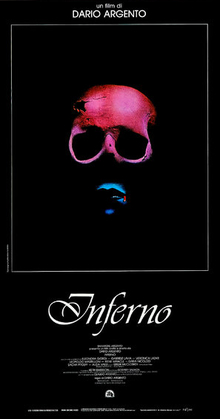
Inferno is a 1980 Italian supernatural horror film written and directed by Dario Argento, and starring Irene Miracle, Leigh McCloskey, Eleonora Giorgi, Daria Nicolodi, and Alida Valli. The plot follows a young man's investigation into the disappearance of his sister, who had been living in a New York City apartment building that also served as a home for a powerful, centuries-old witch. A thematic sequel to Suspiria (1977), it is the second installment of Argento's Three Mothers trilogy. The long-delayed concluding entry, The Mother of Tears, was released in 2007. All three films are partially derived from Thomas de Quincey's 1845 work Suspiria de Profundis, a collection of prose poetry in which he proposes the concept of three "Ladies of Sorrow", concurrent with the three Fates and Graces in Greek mythology.

Tenebrae is a 1982 Italian giallo film written and directed by Dario Argento. The film stars Anthony Franciosa as American author Peter Neal, who – while in Rome promoting his latest murder-mystery novel – becomes embroiled in the search for a serial killer who may have been inspired to kill by his novel. John Saxon and Daria Nicolodi co-star as Neal's agent and assistant respectively, while Giuliano Gemma and Carola Stagnaro appear as detectives investigating the murders. John Steiner, Veronica Lario, and Mirella D'Angelo also feature in minor roles. The film has been described as exploring themes of dualism and sexual aberration, and has strong metafictional elements; some commentators consider Tenebrae to be a direct reaction by Argento to criticism of his previous work, most especially his depictions of murders of women.

Deep Red, also known as The Hatchet Murders, is a 1975 Italian giallo film directed by Dario Argento and co-written by Argento and Bernardino Zapponi. It stars David Hemmings as a musician who investigates a series of murders performed by a mysterious figure wearing black leather gloves. The cast also stars Daria Nicolodi, Gabriele Lavia, Macha Méril, and Clara Calamai. The film's score was composed and performed by Goblin, the first in a long-running collaboration with Argento.

Inferno is the soundtrack to Dario Argento's film of the same title, first released as a 15-track LP in 1980 on Atlantic Records, in 1981 by Cinevox, then as a CD in 2000, with a bonus track of outtakes reportedly utilized in the film itself, but not included on the original vinyl release. The score was composed and performed by keyboardist Keith Emerson, former member of the progressive rock band Emerson, Lake & Palmer.
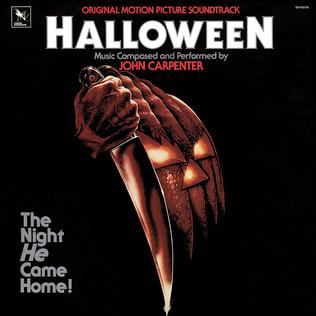
Halloween is a soundtrack album composed and performed by John Carpenter, featuring the score to the 1978 film Halloween. It was released in Japan in 1979 by Columbia Records and in the United States in 1983 through Varèse Sarabande. An expanded 20th Anniversary Edition was released in 1998 through Varèse Sarabande. In 2018, an LP was released by Mondo Records featuring the mono tracks taken from the original 35mm stem of the film and for the first time features the music as originally heard in theaters and on the earliest VHS releases of the film.
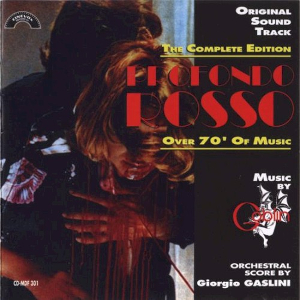
Profondo Rosso is a film soundtrack album for the film of the same name mainly composed and performed by the Italian progressive rock band Goblin, the band's first collaboration with director Dario Argento.
Bixio Music Group, a New York corporation, is the American branch of Gruppo Editoriale Bixio it:Gruppo Editoriale Bixio, or Bixio Publishing Group, the first Italian music publishing company. The Bixio Publishing Group, currently based in Rome, Italy, was established in Naples during the 1920s by composer Cesare Andrea Bixio. Bixio Music Group, an ASCAP member since 1992, was established to facilitate licensing of the Bixio Publishing Group catalogue that includes not only musical compositions but also sound recordings by related labels under the Group in the territories of North and South America.
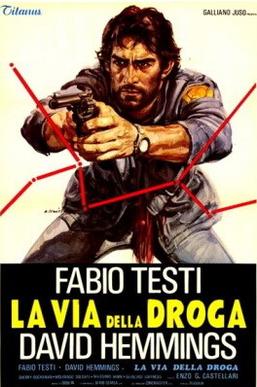
The Heroin Busters is a 1977 Italian crime film directed by Enzo G. Castellari and starring Fabio Testi, David Hemmings and Sherry Buchanan.
Crime and Dissonance is a 2005 compilation album of Italian composer Ennio Morricone's film score work. Intended as a follow-up to two earlier Morricone compilations assembled by Dagored, the album was put together by Alan Bishop and released by Ipecac Recordings. Crime and Dissonance features work ranging from the later 1960s to the early 1980s, and contains scores taken from films of several different genres.
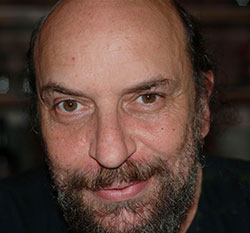
Maurizio Guarini is a self-taught keyboardist, multi-instrumentalist and composer, best known as a member of the progressive rock band Goblin.

The history of horror films was described by author Siegbert Solomon Prawer as difficult to read as a linear historical path, with the genre changing throughout the decades, based on the state of cinema, audience tastes and contemporary world events.
Halloween music is a music genre defined by themes of horror and popularity in association with the holiday of Halloween.